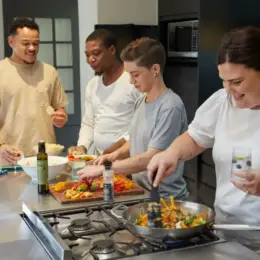
A feminist governance framework recipe
Academics such as Anne Orford have challenged feminists who operate at the intersections of law, equality, and social justice to imagine a rights framework that avoids reproducing the pervasive and often unspoken assumptions of imperialism and patriarchy. To me, feminist governance frameworks challenge masculinist and Eurocentric approaches to labour, decision-making, and communication by calling on us to actively reimagine our relationships to power, authority, and privilege.
As we enter a new decade, we can see all around us the literal and figurative fires being fanned by the flames of transphobia, colonialism, racism, misogyny, xenophobia, and capitalism. But fire is also symbolic of great strength, ceremony, and rebirth. In the midst of the violence around us, we are also inspired to celebrate, unite, and blaze trail pushing forward.

West Coast LEAF, as a feminist legal organization and an organization mostly made up of and supported by settlers, has an enhanced responsibility and obligation to imagine the possibilities. To do that well, we must consider how we govern ourselves, hold ourselves to account, and strive to not only do good work, but to do it in a good way.
We’ve spent time thinking and putting into action how we must work to support and sustain—and not subvert, even unwittingly—the path to a society in which people are not marginalized or stigmatized on the basis of their gender, and the many other bases upon which “value” is assigned in our society (such as Indigeneity, race, ability, citizenship, sexual orientation, religion, socio-economic status).
Here are some of the ingredients I think are necessary to develop a truly feminist governance.
1. Having self-awareness and humility: accepting our strengths, knowing what value we add to the conversation, but equally knowing our vulnerabilities and respecting where we are learners, not leaders.
At West Coast LEAF, we continue to learn from Salal’s acknowledgment of the past harm (formerly WAVAW) its policies and practices have caused and their commitment to action on gender inclusion.
This recipe is a work in progress. It is not yet – nor will it likely ever – be perfected.
2. Uncovering and dismantling individual and structural bias: we have a responsibility to look at how our own personal biases and biases within our organizations contribute to perpetuating structural and systemic inequity.
Check out this piece by the National Equity Project about the parasitic relationship between implicit bias and structural racism.
3. Developing a healthy relationship to power: Power is not about grasping at a slice of an already baked pie, but rather something that grows and mobilizes as it is shared and redistributed. I am awed by the work of Mariame Kaba in ending mass incarceration and mobilizing the power of many.
4. Being accountable and transparent in what we do and how we do it: our collective goals should be mutually defined and developed, and our decisions must be the result of practices that are clear and known. Ann Russo’s book on feminist accountability is shaping my view that accountability is the better part of justice.

5. Understanding that the voices and experiences that have been pushed to the margins must be re-centred on their own terms. For me, this means searching out, for instance, Indigenous storytellers and creators.
This recipe is a work in progress. It is not yet – nor will it likely ever – be perfected. But unlike the proverbial broth, this is one recipe that does get better the more cooks you have.
Raji Mangat is a child of immigrants who settled on Beaver First Nation and Kelly Lake Metis lands in northern Alberta (Treaty 8). As West Coast LEAF’s executive director, she is thinking about making the organization’s work more sustainable and intentional.
Questions? Comments? blog@westcoastleaf.org